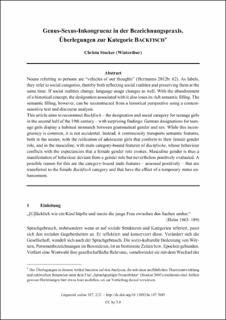Bitte benutzen Sie diese Kennung, um auf die Ressource zu verweisen:
https://doi.org/10.21256/zhaw-23449| Publikationstyp: | Beitrag in wissenschaftlicher Zeitschrift |
| Art der Begutachtung: | Peer review (Publikation) |
| Titel: | Genus-Sexus-Inkongruenz in der Bezeichnungspraxis : Überlegungen zur Kategorie BACKFISCH |
| Autor/-in: | Stocker, Christa |
| et. al: | No |
| DOI: | 10.13092/lo.107.7685 10.21256/zhaw-23449 |
| Erschienen in: | Linguistik Online |
| Band(Heft): | 107 |
| Heft: | 2 |
| Seite(n): | 21 |
| Seiten bis: | 40 |
| Erscheinungsdatum: | 2021 |
| Verlag / Hrsg. Institution: | Bern Open Publishing |
| ISSN: | 1615-3014 |
| Sprache: | Deutsch |
| Schlagwörter: | Personenbezeichnung; Stereotyp; Linguistik; Kategorisierung; Name; Kollokation; Semantik; Genus; Mentalitätsgeschichte; Sexus; Gender |
| Fachgebiet (DDC): | 401.4: Terminologie, Diskursanalyse, Pragmatik 415: Grammatik |
| Zusammenfassung: | Nouns referring to persons are “vehicles of our thoughts” (Hermanns 2012b: 62). As labels, they refer to social categories, thereby both reflecting social realities and preserving them at the same time. If social realities change, language usage changes as well. With the abandonment of a historical concept, the designation associated with it also loses its rich semantic filling. The semantic filling, however, can be reconstructed from a historical perspective using a contextsensitive text and discourse analysis. This article aims to reconstruct Backfisch – the designation and social category for teenage girls in the second half of the 19th century – with surprising findings: German designations for teenage girls display a habitual mismatch between grammatical gender and sex. While this incongruency is common, it is not accidental. Instead, it continuously transports semantic features, both in the neuter, with the reification of adolescent girls that conform to their female gender role, and in the masculine, with male category bound features of Backfische, whose behaviour conflicts with the expectancies that a female gender role evokes. Masculine gender is thus a manifestation of behaviour deviant from a gender role but nevertheless positively evaluated. A possible reason for this are the category-bound male features – assessed positively – that are transferred to the female Backfisch category and that have the effect of a temporary status enhancement. |
| URI: | https://digitalcollection.zhaw.ch/handle/11475/23449 |
| Volltext Version: | Publizierte Version |
| Lizenz (gemäss Verlagsvertrag): | CC BY 3.0: Namensnennung 3.0 Unported |
| Departement: | Angewandte Linguistik |
| Organisationseinheit: | Institut für Übersetzen und Dolmetschen (IUED) |
| Enthalten in den Sammlungen: | Publikationen Angewandte Linguistik |
Dateien zu dieser Ressource:
| Datei | Beschreibung | Größe | Format | |
|---|---|---|---|---|
| 2021_Stocker_Genus-Sexus-Inkongruenz.pdf | 632.02 kB | Adobe PDF |  Öffnen/Anzeigen |
Zur Langanzeige
Stocker, C. (2021). Genus-Sexus-Inkongruenz in der Bezeichnungspraxis : Überlegungen zur Kategorie BACKFISCH. Linguistik Online, 107(2), 21–40. https://doi.org/10.13092/lo.107.7685
Stocker, C. (2021) ‘Genus-Sexus-Inkongruenz in der Bezeichnungspraxis : Überlegungen zur Kategorie BACKFISCH’, Linguistik Online, 107(2), pp. 21–40. Available at: https://doi.org/10.13092/lo.107.7685.
C. Stocker, “Genus-Sexus-Inkongruenz in der Bezeichnungspraxis : Überlegungen zur Kategorie BACKFISCH,” Linguistik Online, vol. 107, no. 2, pp. 21–40, 2021, doi: 10.13092/lo.107.7685.
STOCKER, Christa, 2021. Genus-Sexus-Inkongruenz in der Bezeichnungspraxis : Überlegungen zur Kategorie BACKFISCH. Linguistik Online. 2021. Bd. 107, Nr. 2, S. 21–40. DOI 10.13092/lo.107.7685
Stocker, Christa. 2021. “Genus-Sexus-Inkongruenz in der Bezeichnungspraxis : Überlegungen zur Kategorie BACKFISCH.” Linguistik Online 107 (2): 21–40. https://doi.org/10.13092/lo.107.7685.
Stocker, Christa. “Genus-Sexus-Inkongruenz in der Bezeichnungspraxis : Überlegungen zur Kategorie BACKFISCH.” Linguistik Online, vol. 107, no. 2, 2021, pp. 21–40, https://doi.org/10.13092/lo.107.7685.
Alle Ressourcen in diesem Repository sind urheberrechtlich geschützt, soweit nicht anderweitig angezeigt.